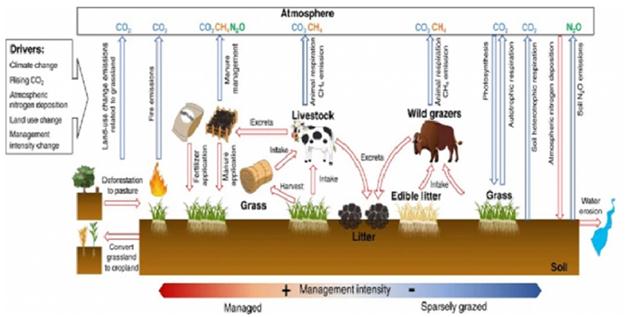Greenhouse gas emissions from man-managed grasslands similar to global croplands
- Posted By
10Pointer
- Categories
Environment
- Published
12th Jan, 2021
-
Context
- Study highlight need to use sustainable management to preserve and enhance soil carbon storage of grasslands.
What does the study reveal?
- Grasslands intensively managed by humans have become a net source of greenhouse gas emissions.
- Emissions of methane (CH4) and nitrous oxide (N2O) from grasslands increased by a factor of 2.5 since 1750 mainly due to increased emissions from livestock.
- The net carbon sink effect of grasslands (the ability of grasslands to absorb carbon and pack it in the soil) worldwide was estimated to have intensified over the last century but mainly in sparsely-grazed, natural grasslands.
- This has more than compensated for reduced emissions from the shrinking number of wild grazers.
Significance of the Study
- The study shows the impacts of the expansion of pasture land and higher livestock numbers in Green House Gases.
- It leads to expect that global grasslands will accelerate climate warming if better policies are not put in place.

What could be done to cure the situation?
- It emphasizes to favour for the soil carbon increase, to stop deforestation for ranching, and develop climate-smart livestock production systems.
- The findings highlight the need to use sustainable management to preserve and enhance soil carbon storage in grasslands.
Green House Gases
- Gases that trap heat in the atmosphere are called greenhouse gases.
- The primary greenhouse gases in Earth's atmosphere are water vapor (H2O), carbon dioxide (CO2), methane (CH4), nitrous oxide (N2O), and ozone (O3).
- Chlorofluorocarbons (CFCs), hydrofluorocarbons (HFCs), hydrochlorofluorocarbons (HCFCs), perfluorocarbons (PFCs), and sulfur hexafluoride (SF6) are sometimes called high-GWP gases.
|
